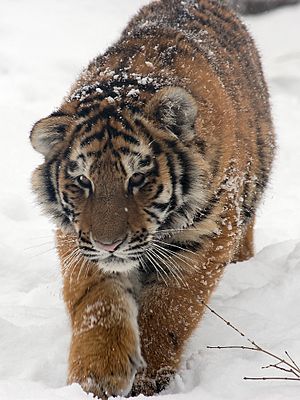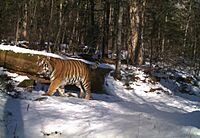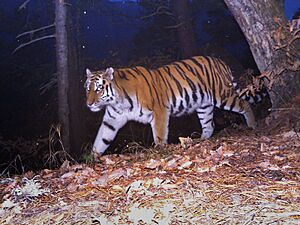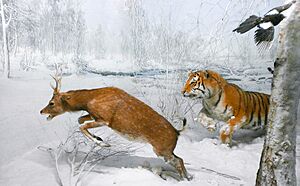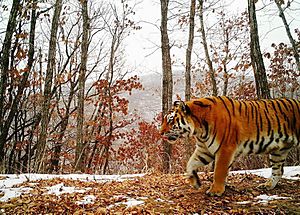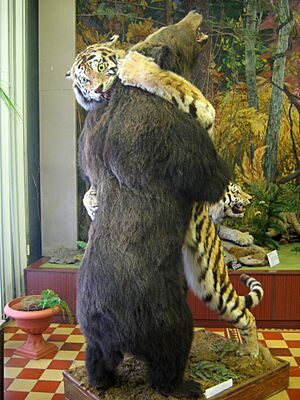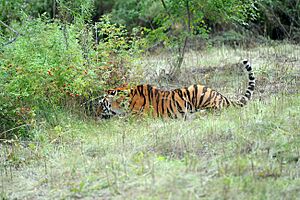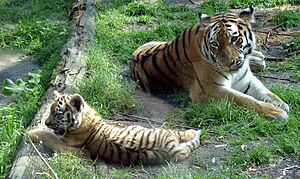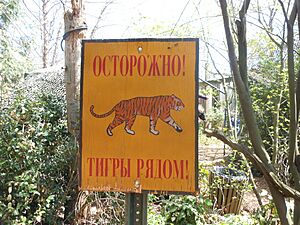Siberian tiger facts for kids
Quick facts for kids Panthera tigris tigris |
|
|---|---|
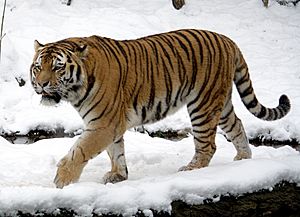 |
|
| A Siberian tiger at the Leipzig Zoological Garden | |
| Scientific classification | |
| Kingdom: | Animalia |
| Phylum: | Chordata |
| Class: | Mammalia |
| Order: | Carnivora |
| Suborder: | Feliformia |
| Family: | Felidae |
| Subfamily: | Pantherinae |
| Genus: | Panthera |
| Species: | P. tigris |
| Subspecies: | P. t. tigris |
| Trionomial name | |
| Panthera tigris tigris | |
 |
|
| Where Siberian tigers live
Today's main areas Areas where they lived in the late 1800s |
|
The Siberian tiger, also known as the Amur tiger, is a large and powerful wild cat. It is a type of tiger that lives in Northeast China, the Russian Far East, and possibly North Korea. Long ago, these tigers roamed across the entire Korean Peninsula. However, their numbers dropped greatly during a historical period between 1910 and 1945.
Today, most Siberian tigers live in the Sikhote-Alin mountains in the Russian Far East. In 2005, there were about 331 to 393 adult and young adult Siberian tigers in this area. Thanks to strong conservation efforts, their population had been stable for over ten years. However, later surveys showed a decline. By 2015, a census showed the population had grown to 480–540 tigers in the Russian Far East, including 100 cubs. A more detailed count confirmed 562 wild Siberian tigers in Russia. Around 2014, about 35 tigers were thought to live near the border between Russia and China. As of 2022, about 756 Siberian tigers, including 200 cubs, were estimated to live in the Russian Far East.
Siberian tigers are closely related to the Caspian tiger, which is now extinct. Scientists believe that the ancestors of both Siberian and Caspian tigers came from eastern China. They traveled through Central Asia and then eastward into Siberia, creating the Siberian tiger population we see today. These two tiger groups lived in the northernmost parts of mainland Asia.
The Siberian tiger has also been called the "Amur tiger," "Manchurian tiger," "Korean tiger," and "Ussurian tiger," depending on where they were found.
Contents
Understanding Tiger Families
In 1758, Carl Linnaeus gave the tiger its first scientific name, Felis tigris. Over time, scientists found different tigers in East Asia and gave them various names. For example, some were named for their long hair or where they lived, like the Amur region or Korea.
For a while, scientists debated how many types of tigers there were. They noticed that many differences, like fur length or stripe patterns, could vary a lot even within the same group of tigers. So, in 2017, experts decided that all tigers living on mainland Asia belong to one main group, called Panthera tigris tigris. This group includes the Siberian tiger, along with Bengal, Malayan, Indochinese, South China, and Caspian tigers. Tigers on islands like Java, Bali, and Sumatra belong to another group, P. t. sondaica.
The Tiger Family Tree

Scientists have studied the genes of Siberian tigers to understand their family history. They found that wild Siberian tigers have low genetic diversity, especially in their maternal (mother's side) genes. This means that many of them share very similar genetic information from their mothers. It's like they all came from a small group of ancestors a long time ago. Tigers in zoos, however, show more genetic variety. This suggests that the wild population might have gone through a "genetic bottleneck," meaning their numbers dropped so low that only a few tigers survived to pass on their genes.
Studies show that Siberian tigers are the closest living relatives of the extinct Caspian tigers. This means they share a very recent common ancestor. Scientists believe these ancestors traveled from eastern China, through Central Asia, and then spread eastward to the Russian Far East.
In 2013, the entire genetic map (genome) of the Siberian tiger was studied. This showed that mainland Asian tigers fall into two main groups: a northern group (Siberian and Caspian tigers) and a southern group (all other mainland tigers). More recent studies in 2018 confirmed six main tiger groups and suggested their common ancestor lived about 110,000 years ago.
What Makes a Siberian Tiger Special?
Siberian tigers have a reddish-rusty or rusty-yellow fur with narrow black stripes. They have a long, flexible body, fairly short legs, and a long tail. An adult tiger's body can be at least 150 centimeters (about 5 feet) long.
How Big Are They?
Siberian tigers are very large cats. In the 1980s, wild male Siberian tigers typically weighed between 180 to 306 kilograms (about 397 to 675 pounds). Females were lighter, usually weighing 100 to 167 kilograms (about 220 to 368 pounds).
Scientists have compared the weights of tigers over time. They found that male and female Siberian tigers were, on average, heavier before the 1950s than they are today. Today's wild male Siberian tigers weigh about 176.4 kg (389 lbs) on average, and females weigh about 117.9 kg (260 lbs). This change might be because there are fewer prey animals due to illegal hunting, or because some tigers captured for study were sick or injured.
Measurements from the Siberian Tiger Project show that males are typically 178 to 208 cm (about 5.8 to 6.8 feet) long from head to body. Females are a bit smaller, ranging from 167 to 182 cm (about 5.5 to 6 feet). Their tails add another 91 to 99 cm (about 3 feet) to their total length. The longest male ever measured was 309 cm (over 10 feet) long, including his tail, and weighed 206 kg (454 lbs).
In 2019, one of the largest Siberian tigers was recorded. It was thought to weigh 384 kg (847 lbs) and measure over 3.3 meters (11 feet) from nose to tail.
Their Strong Skull
The skull of a Siberian tiger is very large and strong, especially around the face and where their canine teeth are. Older males have very high and strong bony ridges on their skulls. These skulls are often much bigger and stronger than those of Bengal tigers. Male skulls can range from 331 to 383 mm (about 13 to 15 inches) in length. Female skulls are always smaller and not as heavily built.
Their Fur Coat
Siberian tigers often have very pale fur, especially in winter. However, their fur color can vary a lot. Their dark stripes are usually dark brown, not pure black, and their shape and length can also differ between individuals.
Their fur is thick, coarse, and not as dense as some other wild cats in the region. Compared to other tiger types, Siberian tigers have very different summer and winter coats. The summer coat is rougher, while the winter coat is much thicker, longer, softer, and silkier. The winter fur can look quite shaggy and grows longer on the head, almost covering their ears. Siberian and Caspian tigers had the thickest fur among all tigers.
The hair on their whiskers, the back of their head, and the top of their neck also grows much longer in winter. The background color of their winter coat is usually less bright and rusty than their summer coat. Because the winter fur is longer, the stripes can look wider and less sharp.
Where Siberian Tigers Live
Long ago, Siberian tigers lived across much of the Korean Peninsula, Manchuria, parts of northeastern China, and the eastern side of Siberia and the Russian Far East. They might have even lived as far west as Mongolia.
Today, their main home stretches for almost 1,000 kilometers (about 620 miles) from south to north in Russia's Primorsky Krai and southern Khabarovsk Krai. They also live in parts of the Greater Xing'an Range that cross into China. This area is a mix of different forest types, including Korean pine forests, which are very important for them.
The forests where they live are home to many different animals. Tigers hunt animals like Manchurian wapiti, Siberian roe deer, and wild boar. These are common in the Sikhote-Alin mountains. Sika deer live in the southern parts of these mountains. Siberian musk deer and Amur moose prefer the conifer forests.
In 2005, there were an estimated 18–22 Amur tigers in China and 331–393 in the Russian Far East. More than 90% of these tigers lived in the Sikhote Alin mountains. Some tigers also live in protected areas around Baekdu Mountain, near the border of China and North Korea.
Recent surveys show their numbers are growing in some areas. In August 2012, a Siberian tigress with four cubs was seen for the first time in northeastern China's Hunchun National Nature Reserve. Between 2013 and 2014, camera traps found 27 to 34 tigers along the China-Russian border. By 2018, surveys showed about 55 Siberian tigers in four forested areas of northeastern China.
How Siberian Tigers Live
Siberian tigers can travel very long distances, sometimes up to 1,000 kilometers (about 620 miles), through connected natural areas. In the early 1990s, scientists estimated there were about 0.62 tigers per 100 square kilometers in the Sikhote-Alin mountains. This was a lower number compared to other tiger groups at the time.
However, a study in 2004 found that when tigers are well protected from human threats for a long time, the number of adult female tigers increases significantly. When more females survive, mothers sometimes share their hunting grounds with their grown-up daughters. By 2007, the tiger population density in parts of the Sikhote-Alin protected area had increased.
Siberian tigers share their home with Amur leopards. In the Changbai Mountains, tigers are often found at lower elevations than leopards.
Hunting and What They Eat
Tigers are skilled hunters. Their main prey includes large hoofed animals like Manchurian wapiti, Siberian musk deer, long-tailed goral, moose, Siberian roe deer, sika deer, and wild boar. They sometimes even hunt smaller Asiatic black bears and brown bears. Siberian tigers also eat smaller animals like hares, rabbits, pikas, and even salmon.
A study between 1992 and 1994, using radio-collars on 11 tigers, showed that tigers often live where Manchurian wapiti are found. Wild boar are also a common food source.
Another study from 2009 to 2012 found that tigers hunt more often in winter. In summer, they killed prey every 7.4 days and ate about 7.89 kg (17.4 lbs) of meat daily. In winter, they hunted larger animals, made a kill every 5.7 days, and ate about 10.3 kg (22.7 lbs) daily.
Tigers and Other Animals
Siberian tigers are at the top of their food chain. They sometimes interact with bears. After a period when their usual prey animals decreased (1944-1959), there were 32 recorded cases of Amur tigers attacking Ussuri brown bears and Ussuri black bears in the Russian Far East. Tigers usually target younger or smaller bears, especially when bears are less active. Bears' hair has been found in tiger droppings. Tigers mostly eat the fat from bears.
However, bears can also be dangerous to tigers. In the same period, four cases were reported where brown bears killed female tigers and young cubs, either in fights over food or in self-defense. Brown bears sometimes follow tiger tracks to find leftover food or even to try and take down a tiger. Some studies show that bears often try to steal food from tigers. In one reserve, 35% of tiger kills were taken by bears. There are also reports of brown bears killing tigers, including adult males.
Tigers also affect wolf populations. Where tigers live, wolf numbers are usually very low, sometimes even disappearing from an area. This is because tigers and wolves hunt similar prey, leading to strong competition. When tiger numbers dropped in the past, wolf numbers increased. Today, wolves are rare in tiger habitats and are usually seen alone or in small groups. Tigers have been known to chase wolves away from their kills.
Siberian tigers also compete with the Eurasian lynx and sometimes kill them. This might be because the tiger sees the lynx as a competitor for food.
Reproduction and Life Cycle
Siberian tigers can mate at any time of the year. A female tiger lets males know she is ready by leaving scent marks and scratch marks on trees. She stays with a male for about 5 or 6 days.
Tiger cubs are born after about 3 to 3½ months. A mother usually has two to four cubs, but sometimes up to six. The cubs are born blind in a safe den. The mother leaves them alone when she goes to hunt for food. At birth, there are usually an equal number of male and female cubs. However, by the time they are adults, there are often more females than males.
Female cubs stay with their mothers longer and later set up their own territories close to where they grew up. Male cubs, however, travel alone and move farther away earlier in their lives. This makes them more vulnerable to dangers like illegal hunters or other tigers.
Tigers are considered young adults at 35 months old. Males become ready to have their own cubs between 48 and 60 months of age.
Siberian tigers usually live for 16–18 years. In the wild, they typically live 10–15 years, but in zoos, they can live up to 25 years.
Threats to Siberian Tigers
Genetic studies of 95 wild Siberian tigers in Russia showed that their genetic diversity is low. This means that only a small number of tigers contributed their genes to the current population. This is a problem because most of the tigers live in one main area, the Sikhote Alin mountains. Tigers rarely cross the developed areas that separate this group from smaller groups.
Illegal hunting (poaching) of tigers and the animals they eat is a major threat. For example, in China's Huang Ni He National Nature Reserve, illegal hunters set many traps. There are not enough people to patrol this large area. In Hunchun National Nature Reserve, poaching of deer and wild boar makes it harder for the tiger population to grow.
Past Dangers
After the Soviet Union ended, illegal logging and other problems made it easier for poachers to hunt Siberian tigers. Local hunters could sell tiger parts in a profitable market, which put the tigers at risk of disappearing again. While more money is now spent on protecting tigers, increased human activity also leads to more development and forest loss. A big challenge is that each tiger needs a very large territory to live, up to 450 square kilometers (about 174 square miles) for a female, and even more for a male.
The Siberian tiger was once common in the Korean Peninsula but disappeared from the area during a historical period between 1910 and 1945.
Protecting Siberian Tigers
Tigers are listed under CITES Appendix I, which means international trade in tigers and their parts is banned. Countries where tigers live and countries that buy tiger products have also banned domestic trade. In 2007, stronger rules were called for to stop tiger farming.
In 1992, the Siberian Tiger Project started. Its goal is to learn all about Amur tigers and their role in the Russian Far East through scientific studies. By catching tigers and fitting them with radio collars, scientists study how they live, use their land, what they eat, how they reproduce, and how they interact with other animals and humans. This information helps reduce threats from illegal hunting. The project also helps solve conflicts between tigers and people and trains new conservation biologists.
In August 2010, China and Russia agreed to work together to protect Amur tigers in areas along their shared border. China has also held public events, like the first Global Tiger Day in 2010, to raise awareness.

Bringing Tigers Back
Scientists have discussed bringing Siberian tigers back to safe places in Central Asia, since they are closely related to the extinct Caspian tiger. One idea was the Amu-Darya Delta. However, studies showed that this area doesn't currently have enough large, connected habitat or enough prey animals to support a healthy tiger population.
Another possible place in Kazakhstan is the Ili River delta. This area used to be home to the Caspian tiger until 1948. It has a large wetland with many wild boars. There are also plans to reintroduce the Bactrian deer, which was once an important prey animal. Because of this, the Ili delta is considered a good place to bring tigers back.
In 2010, Russia traded two captive Siberian tigers for Persian leopards with Iran. The plan was to release these animals into the wild. However, this idea is debated because not all reintroduction projects succeed. Also, Siberian tigers are not exactly the same as Caspian tigers, and the climate in Iran is warmer than in Siberia. Introducing animals to a new habitat could cause unexpected problems. One of the tigers sent to Iran sadly passed away in December 2010. Despite these challenges, some people support the project, and Iran has successfully brought back other animals like the Persian onager.
In 2005, there were plans to reintroduce Siberian tigers to Pleistocene Park in Russia, but only if the population of plant-eating animals there grew enough to support large predators.
Tigers in Zoos
In recent years, the number of tigers bred in zoos and special facilities in China has grown to over 4,000 animals. This makes China home to the second-largest captive tiger population in the world, after the U.S.
In 1986, China created the Harbin Siberian Tiger Park to breed Siberian tigers and protect their genetic diversity. The park aims to ensure a healthy population of tigers. South Korea also received three tigers from Russia in 2011.
Siberian tigers rarely attack humans without being provoked. In the past, there were more reports of attacks, especially in Central Asia. Tigers were usually not seen as dangerous unless they were bothered. However, some historical accounts mention tigers attacking people collecting firewood or traveling through thickets.

Tigers in Culture
The name 'Siberian tiger' was first used in the 1830s. The name 'Amur tiger' became popular in 1933.
The Tungusic peoples saw the tiger as almost a god, calling it "Grandfather" or "Old man." The Udege and Nanai people call it "Amba." The Manchu people called the Siberian tiger Hu Lin, meaning "king." Because tigers have a mark on their forehead that looks like the Chinese character for 'King' (Chinese: 王; pinyin: Wáng), or a similar character meaning "Great Emperor," they are highly respected by many people. The Siberian tiger is also an important national symbol for the Korean people.
See also
 In Spanish: Tigre siberiano para niños
In Spanish: Tigre siberiano para niños
-
- Mainland Asian tiger populations: Bengal tiger
- Indochinese tiger
- Malayan tiger
- Siberian tiger
- South China tiger
-
- Sunda Island tiger populations: Javan tiger
- Sumatran tiger
- Bali tiger
- Bornean tiger
-
- Prehistoric tigers: Panthera tigris soloensis
- Panthera tigris trinilensis
- Panthera tigris acutidens
- Amur leopard
- Bergmann's rule
- Holocene extinction




